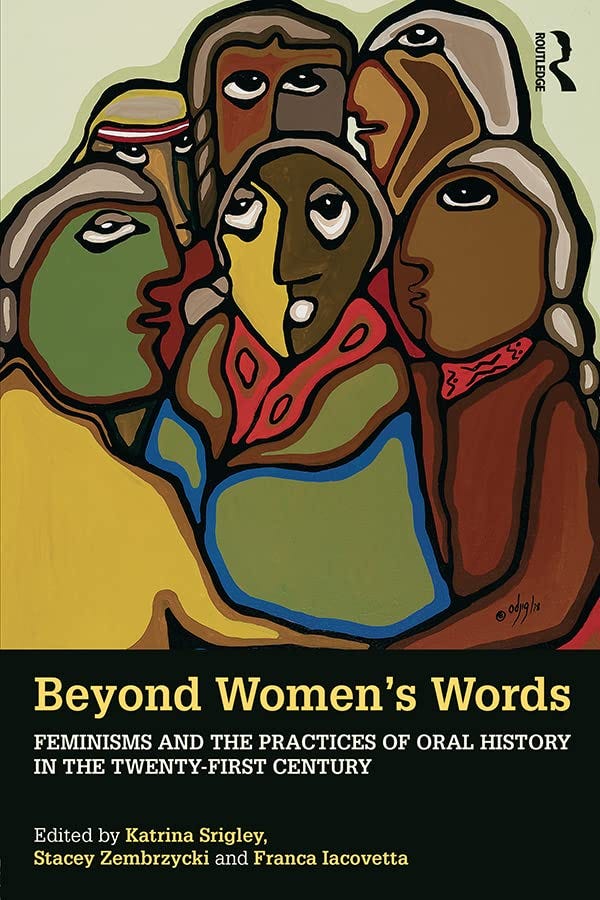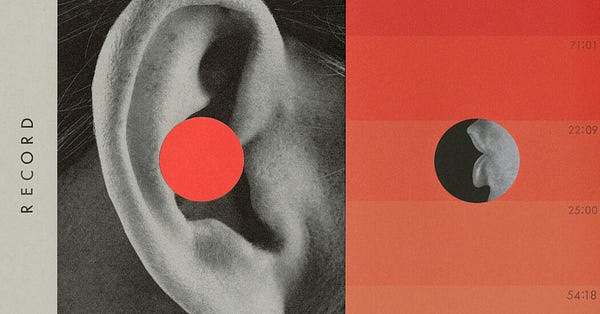The (Mythical) Mother's Voice
On (feminist) oral histories, stories of our mothers and recording loved ones
I just finished the podcast Before Me, a five-part oral history of a woman’s journey from Cambodia to America as told to her journalist daughter. Lisa Phu is that daughter, who, at the time of recording, had just had her first baby. Her mother, Lan comes to visit and Lisa takes the opportunity to interview and record her. Lan’s incredible story is one of sacrifice, bravery, determination and resilience in the face of the Cambodian genocide by the Khmer Rouge: so much death, forced immigration and adapting to a life in a new language and culture in America.
But as Lisa writes, “it’s also a long overdue conversation between my mom and me, about our family’s history…while we may never fully understand the reality of those who came before us, every story is a chance to get closer.”
Unsurprisingly, I was moved by the podcast, and sadly know Lan’s story of escape and survival is all too common and happening every day. Whenever I hear immigration stories, I also think of my own mother, who, although in vastly different circumstances, came to Canada at 30 years old with a young child to a foreign culture and a new language. (There was definitely a culture shock coming from a bustling Krakow, Poland to Saskatchewan, Canada in the dead of winter when temperatures drop to – 40°C and fields of snow go on and on forever.)
During the podcast, one of the ads played was for a software to create your own oral history. It made me think how very few people likely consider recording family members and their stories, whether they are devastating ones of war and immigration or simpler yet also important stories of living in the same rural town, for example.
“A method for conducting historical research through recorded interviews between interviewer and interviewee” oral history is about memory, the past and the future. It is also about knowledge-sharing and has deep roots in Indigenous modes of storytelling that are centred around oral-based knowledge systems often passed on through stories and ceremonies. This from Indigenous Foundations discusses the difference between oral traditions and oral histories and how transcription factors in. Other examples: the importance of yarning, the Cambodian Women Oral History project, the oral histories of formerly enslaved Virginians and many more incredible initiatives I could go on about. There are also organizations and initiatives creating oral histories about and making them accessible for those who are hard of hearing and the deaf community. This is why transcripts and show notes are also vital. I have used the terms here, but I want to note that “hearing” “voice” and “oral” exclude many people.
My PhD research draws on a feminist narrative inquiry method, and I have been reading a lot how oral histories and life stories (recorded and transcribed word-for-word) centre the voices of mothers and women. It is feminist work.

The topic of oral histories naturally makes me consider voice. Before the holidays, Jancee Dunn wrote about the gift of recording family members, especially if they are older, in The New York Times Well newsletter. One of her interviewees notes that recording a conversation with a loved one is, “a gift that keeps on giving, because we extend their life beyond their literal physical presence. We still have access to them.”
In response to the article, I tweeted:


It was one of the most emotional moments during our wedding reception. I have a photo of myself from that moment, head turned to one of my oldest friends sitting beside me, my shoulders are hunched over, my hand covers my face as I hold back the tears after hearing my grandmother’s voice. She was at the time still alive but couldn’t come to Canada from Poland for the wedding.
More recently, while at a celebration of life for a dear friend, I thought I was holding it together and had shed the bulk of my tears the night before until a video began to play. When I heard his voice and his infectious laugh, knowing I would never hear them again in real life, with a tidal force, the tears came.
A few months ago, I heard a news report about hospice biographers recording stories of people who are in their last days so their families have something, or rather, their voices and their stories, after they die. It was a beautiful reminder that every story is worth telling, no matter how “ordinary” it may seem. And if you want another example of how powerful and emotional hearing someone’s voice can be, especially if you no longer hear it in real life, there is the famous story about London’s Embankment station “Mind the Gap” announcement voice.

In the NYT article, Dunn mentions a study I am familiar with about a mother’s voice and how “maternal speech decreases pain scores and increases oxytocin levels in preterm infants during painful procedures”. There is also this study about how the stress levels of young girls, 7 to 12 years go down after hearing their mothers’ voices on the phone. But unfortunately by 13, the teen brain tunes in less to a mother’s voice according to this study. I am sure we’ve all heard a version about the mother’s voice and babies in utero. Studies show that by the third trimester, the fetus distinguishes its mother’s voice from all other voices, and although babies are born “universal language learners” (more on this one to come!) studies have also shown they mirror the melodic patterns of the language of their mothers.
We are fascinated by the mother’s voice, for better and sometimes for worse. I have two caveats here: the scientific-study-to-magazine-article pipeline is deeply flawed. Publications report what they think will be a good headline or click so it is important to read the studies and look at the details. Secondly, as poetic and comforting it is to know a baby knows its mother’s voice, often it becomes a case of the mythical mother’s voice and rather than a comfort, becomes a source of shame and guilt for many mothers.
If you do not speak to your child in utero, it does not mean you will not bond with them. If you can’t get to the phone to comfort your child after a stressful event, it does not mean they will necessarily be more stressed than their peers or that it will affect them long-term. And of course, there are many different ways to become a mother, to mother and to bond with your child. Biological motherhood is only one way and mothers of deaf children and mothers who are deaf themselves are often excluded from this type of mythical-mother’s-voice discourse. When it comes to mothers and language, often what is meant to be informative and assuring, is then taken to an impossible level for most mothers. Something that again, does not happen often (ever?) for fathers.
In the last episode of Before Me, without giving away spoilers, my favourite parts were the in-between moments and silences when Lisa and Lan were emotional, thanking each other for the time, the interview, the life. You can hear some movement, possibly hugging, or someone tenderly stroking shoulders while the other person cries, a baby making noises. Yes, oral histories are about voices, but they are also about everything else, all the other cues, even body language we cannot see.
It reminds me of one of my favourite books about history and mothering, Mother Is a Verb: An Unconventional History (In the UK simply, Mother: An Unconventional History) by Sarah Knott. In the section on method, Knott ends with this :
“Doing history, like mothering, is a form of embodied labour.”
- Sarah Knott, Mother is a Verb: An Unconventional History
As always, thank you for reading.






So much to say about oral history and also about how little we know of our parents as ‘people’ unrelated to our experiences of them as our parents. Wouldn’t it have been amazing to come across them as young people and know them!